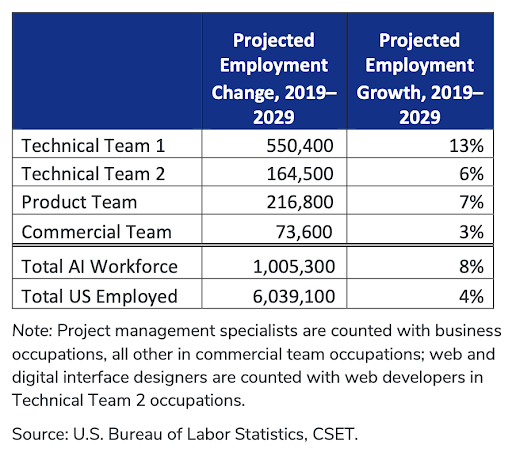We’ll go over the particulars of the different career paths in a moment, but first we want to cover the skills that are common, albeit in varying degrees, across the technical roles in the field. In general, an AI professional will need:
Foundation in mathematics
Mathematics, especially statistics and linear algebra, are the key to artificial intelligence: writing, improving, and trouble-shooting AI algorithms or machine learning models requires a solid understanding of probability calculations, optimization, vectors, and many other advanced mathematical concepts. This is particularly the case for artificial intelligence subdisciplines like deep learning, the realm of machine learning where a series of algorithms called a neural network learns how to recognize images, operate prostheses, or even play complex games like Go.
Programming fluency
Most employers require applicants to be fluent in at least one programming language, and in reality, most successful applicants will know several. Popular programming languages in artificial intelligence include Python, R, Java, and C++. AI professionals must also be familiar with coding platforms and environments like PyTorch and TensorFlow.
Data management
In the end, artificial intelligence and machine learning are powered by data, and often so-called big data, the massive and complex data sets accompanying the proliferation of mobile devices, internet activity, and various sensors and cameras across the globe. The importance of data for AI means that AI professionals need to be well-acquainted with cloud computing systems large and powerful enough to store and analyze this data — Amazon Web Services (AWS) being the most popular. Oftentimes, they must also be experienced with the various techniques and processes along the data pipeline, including data cleansing, which prepares data for analysis, data mining, which probes large data sets for patterns, and data visualization, which helps to communicate findings.
Industry expertise
While not required for all jobs, especially when they are entry-level, many companies will want their incoming employees to have some industry background. An understanding of the industry allows AI professionals to better contextualize their own contributions, implement solutions that have worked elsewhere in the industry, and communicate better with various stakeholders.
Soft skills
While much of the focus when applying for AI jobs is on technical skills, companies are increasingly seeking individuals with strengths in soft skills like critical thinking, leadership, and communication. This should come as no surprise: the World Economic Forum’s list of Top 10 Skills of 2025 is heavy with soft skills. As many more people learn to code in the coming years, the differences among applicants will be in how well they can perform in the non-technical aspects of the job.

